
Cyril M. Kornbluth was an American science fiction author and a member of the Futurians. He used a variety of pen-names, including Cecil Corwin, S. D. Gottesman, Edward J. Bellin, Kenneth Falconer, Walter C. Davies, Simon Eisner, Jordan Park, Arthur Cooke, Paul Dennis Lavond, and Scott Mariner.
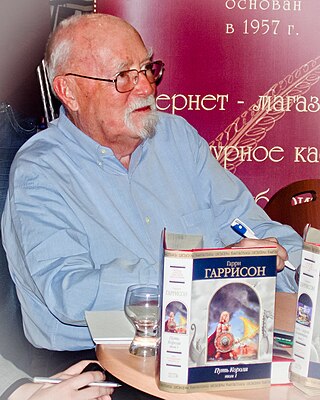
Harry Max Harrison was an American science fiction author, known mostly for his character The Stainless Steel Rat and for his novel Make Room! Make Room! (1966). The latter was the rough basis for the motion picture Soylent Green (1973). Long resident in both Ireland and the United Kingdom, Harrison was involved in the foundation of the Irish Science Fiction Association, and was, with Brian Aldiss, co-president of the Birmingham Science Fiction Group.

Judith Josephine Grossman, who took the pen-name Judith Merril around 1945, was an American and then Canadian science fiction writer, editor and political activist, and one of the first women to be widely influential in those roles.
The Golden Age of Science Fiction, often identified in the United States as the years 1938–1946, was a period in which a number of foundational works of science fiction literature appeared. In the history of science fiction, the Golden Age follows the "pulp era" of the 1920s and '30s, and precedes New Wave science fiction of the '60s and '70s. The 1950s are, in this scheme, a transitional period. Robert Silverberg, who came of age then, saw the '50s as the true Golden Age.
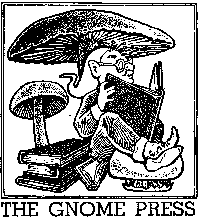
Gnome Press was an American small-press publishing company active 1948 – 1962 and primarily known for fantasy and science fiction, many later regarded as classics.
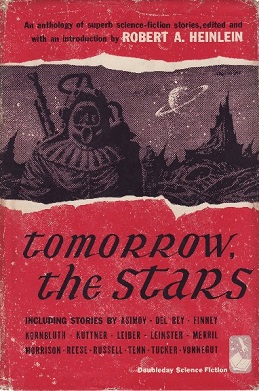
Tomorrow, the Stars is an anthology of speculative fiction short stories, presented as edited by American author Robert A. Heinlein and published in 1952.
Cyril Judd was a joint pseudonym used by American writers Cyril M. Kornbluth and Judith Merril for their two novels:

The Space Merchants is a 1952 science fiction novel by American writers Frederik Pohl and Cyril M. Kornbluth. Originally published in Galaxy Science Fiction magazine as a serial entitled Gravy Planet, the novel was first published as a single volume in 1953, and has sold heavily since. It deals satirically with a hyper-developed consumerism, seen through the eyes of an advertising executive. In 1984, Pohl published a sequel, The Merchants' War. In 2012, it was included in the Library of America omnibus American Science Fiction: Four Classic Novels 1953–1956. Pohl revised the original novel in 2011 with added material and more contemporary references.
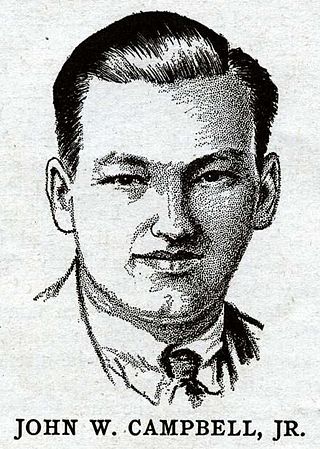
This is a bibliography of works by American writer John W. Campbell Jr.

The 9th World Science Fiction Convention (Worldcon), also known as Nolacon I, was held 1–3 September 1951 at the St. Charles Hotel in New Orleans, Louisiana, United States.

SF '57: The Year's Greatest Science Fiction and Fantasy is a 1957 anthology of science fiction and fantasy short stories edited by Judith Merril. It was published by Gnome Press in an edition of 3,000 copies and was the second in a series of 12 annual anthologies edited by Merrill. Most of the stories originally appeared in the magazines Infinity Science Fiction, Fantasy and Science Fiction, Astounding, The London Observer, Future, Science Fiction Stories, Playboy, Harper's Magazine, Tiger, Fantastic Universe, Science-Fantasy, Galaxy Science Fiction and Esquire.

To the Stars is a science fiction novel by American writer L. Ron Hubbard. The novel's story is set in a dystopian future, and chronicles the experiences of protagonist Alan Corday aboard a starship called the Hound of Heaven as he copes with the travails of time dilation from traveling at near light speed. Corday is kidnapped by the ship's captain and forced to become a member of their crew, and when he next returns to Earth his fiancée has aged and barely remembers him. He becomes accustomed to life aboard the ship, and when the captain dies Corday assumes command.

In Search of Wonder: Essays on Modern Science Fiction is a collection of critical essays by American writer Damon Knight. Most of the material in the original version of the book was originally published between 1952 and 1955 in various science fiction magazines including Infinity Science Fiction, Original SF Stories, and Future SF. The essays were highly influential, and contributed to Knight's stature as the foremost critic of science fiction of his generation. The book also constitutes an informal record of the "Boom Years" of science fiction from 1950 to 1955.

Children of Wonder is an anthology of science fiction and fantasy stories edited by William Tenn, published in hardcover by Simon & Schuster in 1953. It was reprinted in paperback in 1954 by Permabooks, under the title Outsiders: Children of Wonder. The only anthology edited by Tenn, its stories feature children with superhuman or supernatural talents.
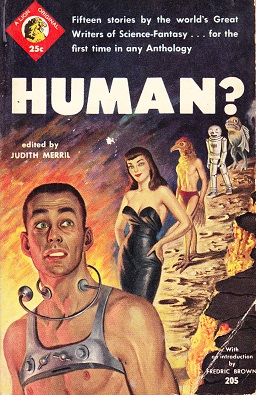
Human? is an anthology of science fiction and fantasy stories edited by Judith Merril, published as a paperback original by Lion Books in 1954. No further editions were issued.

Shadow on the Hearth is a science fiction novel by American writer Judith Merril, originally published in hardcover by Doubleday in 1950. It was her first novel. A British hardcover was published by Sidgwick & Jackson in 1953, with a paperback following from Compact Books in 1966. Italian translations appeared in 1956 and 1992; a German translation was issued in 1982. It was included in Spaced Out: Three Novels of Tomorrow, a 2008 NESFA Press omnibus compiling all Merril's novels. No American paperback of Shadow on the Hearth has ever been published, although a book club edition appeared.

A Mile Beyond the Moon is a collection of science fiction stories by American writer C. M. Kornbluth, originally published as a Doubleday hardcover in 1958, shortly after Kornbluth's death. A Science Fiction Book Club edition appeared in 1959, with an abridged paperback edition following from Macfadden Books in 1962. Macfadden reissued the collection in 1966 and, as Manor Books, in 1972 and 1976. A German translation appeared in 1974, and an Italian translation in 1987. While no further editions of the collection were published, all the stories are contained in NESFA's 1997 His Share of Glory: The Complete Short Science Fiction of C. M. Kornbluth.

Space Mail is an anthology of science fiction short works edited by Isaac Asimov, Martin H. Greenberg, and Joseph Olander. It contains a series of short stories written in the form of letters, diary entries, or memoranda. The book is broken into three sections, each of which contains stories written in the type of documentation after which the section is named.

The Best of C. M. Kornbluth is a collection of science fiction and fantasy short stories by American author C. M. Kornbluth, edited by Frederik Pohl. It was first published in hardback by Nelson Doubleday in October 1976 and in paperback by Ballantine Books in January 1977, as a volume in its Classic Library of Science Fiction. A second hardcover edition was issued by Taplinger in November 1977, and an ebook edition by Faded Page in December 2017.
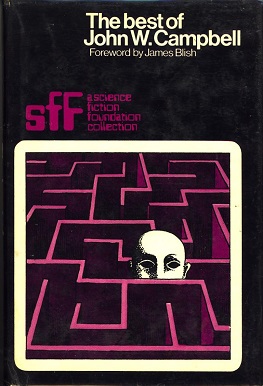
The Best of John W. Campbell is the title of two collections of science fiction short stories by American author John W. Campbell. The first, a British edition edited by George Hay, was first published in hardcover by Sidgwick & Jackson in February 1973, and in paperback by Sphere Books in November 1976. Sidgwick & Jackson later gathered together with The Far-Out Worlds of A. E. van Vogt (1968) into the omnibus volume Science Fiction Special 15 (1975), and with Brian N. Ball's Singularity Station (1973) and Poul Anderson's Orbit Unlimited (1961) into the omnibus volume Science Fiction Special 20 (1977). The second collection of this title, an American edition edited by Lester del Rey, was first published in hardcover by Nelson Doubleday in May 1976, and in paperback by Ballantine Books in June 1976 as a volume in its Classic Library of Science Fiction. The American edition was reprinted by Del Rey/Ballantine in February 1995, and has also been translated into German.


















